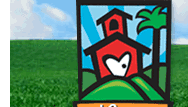| Legal Action Launched on Lead in Artificial Turf
Contact: Caroline Cox, 510-594-9864x308; Charles Margulis, 510-697-0615 (cell)
FOR IMMEDIATE RELEASE
June 23, 2008
Lead threats
from synthetic turf are not just from sport fields! Testing
finds lead in artificial grass from Home Depot, Lowe's, Ace
Hardware, OSH and residential installers
Oakland, CA-
Independent testing commissioned by the Center for Environmental
Health (CEH) has found high levels of lead in artificial turf,
including turf and indoor/outdoor grass carpet purchased from
Home Depot, Orchard Supply Hardware (OSH), Ace Hardware and
Lowe's, as well as from carpet retailers, online marketers, Bay
Area turf installers, and from turf obtained from a Bay Area
elementary school. A test result on one sample showed that a
single wipe of a child's hand on the turf could, if the child
then wiped her hand on her mouth, suffer a lead exposure in
violation of California law.
"Parents see
their kids playing on artificial turf and they expect the turf
to be safe," said Michael Green, Executive Director of CEH. "But
we found that artificial grass and turf can pose a real health
threat to children. You may not have to mow it or water it, but
unfortunately our findings show that you do have to test it for
lead."
Recent
reports have found high lead levels in turf on artificial turf
playing fields, but the CEH testing shows that artificial grass
used by residential installers and sold to do-it-yourselfers can
also be a health threat. In addition to the home improvement
retailers, the CEH testing found lead in indoor/outdoor grass
carpets made by Shaw Floors and Atlas Floor Coverings; and
artificial grass obtained from residential installers and
dealers in turf for do-it-yourself installation, including
AstroLawn and SynLawn (divisions of AstroTurf, a subsidiary of
Crystal Products), U.S. Turf, NewGrass, ProGreen International,
Best Turf for Less, Turf Headquarters, Forever Lawn, and
Synthetic Turf International.
CEH
initiated legal action against the retailers and synthetic turf
companies under California's Proposition 65 law today. The
nonprofit is calling for turf makers to reformulate their
products to eliminate the lead risk to children. CEH is
recommending that parents and schools be sure that children wash
their hands thoroughly after playing on artificial turf fields.
The nonprofit is also announcing that parents, schools or others
with artificial turf fields can send samples of turf for free
lead testing to the nonprofit's Oakland office.
Last week,
the Centers for Disease Control (CDC) released a warning about
potential lead exposures from turf, stating that "As the turf
ages and weathers, lead is released in dust that could then be
ingested or inhaled, and the risk for harmful exposure
increases." One of the turf samples CEH found with high levels
of accessible lead was obtained from the yard of a Bay Area
elementary school that had the turf installed (3) years ago.
Children
playing on artificial grass can be exposed when lead from turf
wipes off onto their hands (from hand-to-mouth behaviors), and
young children may be more at risk since they are more likely to
swallow turf material. Children can also be exposed when turf
degrades in the sun and releases lead-tainted dust. In the
1990's, the CPSC announced recalls of certain vinyl mini-blinds
due to the potential for lead poisoning from dust on the
blinds.
Lead is a
neurotoxin that can cause learning disorders, brain and nerve
damage, hearing problems, stunted growth, and digestive
problems. Scientists are increasingly concerned that there is no
safe level of lead exposure, especially for young children.
The testing
commissioned by CEH analyzed total lead concentration in turf
and also used a standard wipe test to ascertain the amount of
accessible lead from contact with the turf. The tests found high
levels of lead in both nylon and polyethylene turf samples.
In New
Jersey, several turf fields have been closed after high lead
levels were found. The New Jersey Department of Health and
Senior Services (NJDHSS) recently tested artificial turf and
dust from turf fields and found that lead in turf can become
accessible and pose a health hazard when digested. In a letter
to CPSC, the NJ agency stated that its testing showed that "lead
dissolves from turf fibers and the turf field dust under stomach
acid conditions, and is available to be absorbed through the
small intestine."
According to
the synthetic turf industry, the NJ study confirmed the safety
of turf. But NJDHSS found otherwise, stating that for children
exposed to lead from artificial turf, "the potential for lead
poisoning to occur is plausible." The agency also called for
alternatives to the use of lead in the manufacture of synthetic
turf.
In May, the
California Senate passed a bill sponsored by Senator Abel
Maldonado (R-Santa Maria) calling for a state study
investigating the health and environmental impacts of natural
versus synthetic turf fields. The bill, SB 1277, now goes to the
Assembly.
A CEH report
and more information is available at
www.cehca.org . Consumers with questions about sending
samples for lead testing to CEH can call 510-594-9864.
The CDC
statement is available at
http://www.cdc.gov/nceh/lead/artificialturf.htm
The NJDHSS
press release and more information is available at
http://nj.gov/cgi-bin/dhss/njnewsline/view_article.pl?id=3190
|


